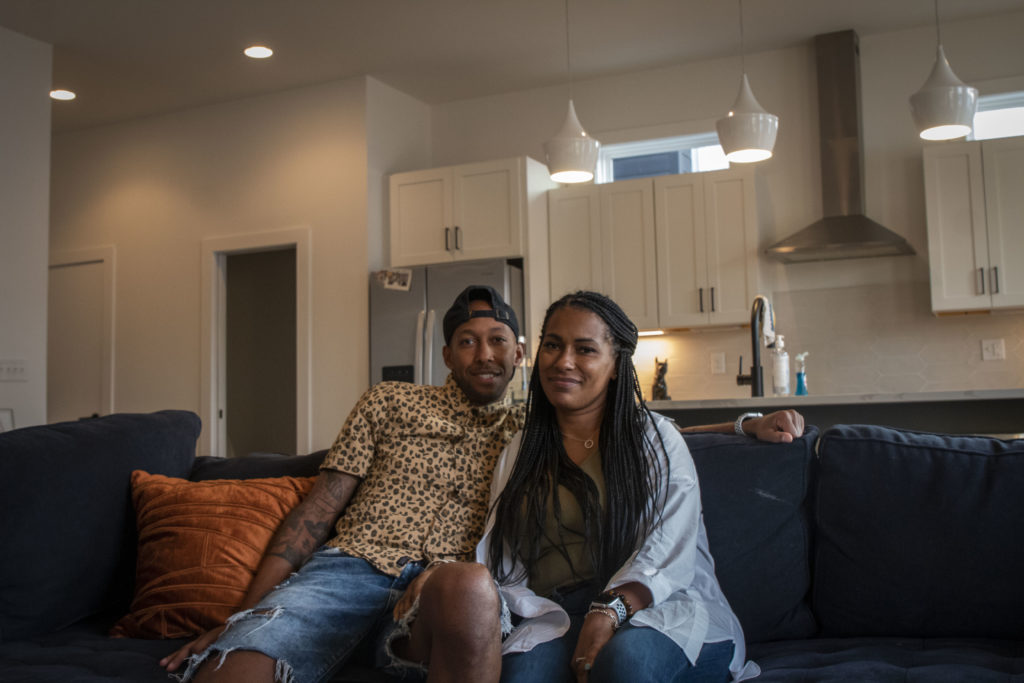
Ellen Mahurin’s Franklin townhome is a classic 1980s build with grey aluminum siding and two spacious upstairs bedrooms.
But it’s not enough space for Mahurin and her two teenage kids. It’s all she could afford in the area so she’s been sleeping on her couch.
“I needed to find it fairly quickly after my husband and I separated,” she says.
Between Mahurin’s person life and the COVID-19 pandemic, her job and living arrangements were shaken up. She had been making up to $80,000 as an animal behaviorist and comfortably paying around $1,200 in rent.
Now rent eats up 50% of her check and all her safety nets are tapped. The U.S. Department of Housing and Urban Development says residents should only spend 30% of their income on housing for it to be considered affordable.
Mahurin scrolls through Craigslist and other sites weekly hoping to find a cheaper apartment in Franklin, so her daughter can stay in the school district, but so far she’s had zero luck.
That led her to ask Nash In The Know: While many are struggling to pay rent due to the pandemic, how has the housing market in greater Nashville continued to thrive?
“What universe am I living in? And who are these other people who apparently can afford to buy and sell all these houses or rent these high priced apartments,” she says.
To answer her question, the average homebuyer in the Nashville area is around 40 years old and the median household income is $92,691. That’s almost $30,000 more than a decade ago.
“How can I get a job like that? That’s what I want to know,” Mahurin tells WPLN News after we shared the National Association of Realtors’ data with her. “What do people do?”
How does home-buying impact the rental market?
Rising incomes is one of the factors driving up prices. Another is that, after the Great Recession, investors started purchasing foreclosed homes nationwide. Investors converted these homes into more expensive rentals, says Ken Chilton, an associate professor at Tennessee State University.
“It’s no longer just families competing with other families to buy a single-family home or rent an apartment,” Chilton says.
He adds that some small mom-and-pop landlords are mirroring a lot of what works for big landlords, including looking for wealthier renters.
“Landlords have decided over the last five to 10 years, that they can make a lot more money on the private side and have opted out of being Section 8 landlords,” Chilton says, referring to the federal rental assistance program.
Plus the federal government isn’t pitching in as much money for affordable housing as they used to. So that leaves cities and nonprofits trying to solve a big problem with little capital.
 Ambriehl Crutchfield WPLN News
Ambriehl Crutchfield WPLN NewsNyeisha and Marcell Jones say older residents have been excited to see a younger Black couple moving into the newly built home.
A D.C. couple starts to create generational wealth
Renters are more likely to feel the increase since they renew leases yearly. In Buena Vista, a neighborhood in North Nashville, a young Black couple was able to dodge most of these pressures when they purchased their home.
Nyeisha Jones and her husband, Marcell, recently moved from the Washington, D.C., area. In the first couple months of the pandemic, they bought their home for a little over $477,000.
“Marcell had this idea — and maybe I sold him on this — that we were going to save so much money moving here and our house would be so much less expensive,” Nyeisha Jones says. “And when I lived here the first time it was. But I didn’t know it went up so high.”
She’s right. With competition tightening and the supply of housing dropping, prices are on the rise for homebuyers and for renters.
When it came to finding the perfect house, Marcell wasn’t tied to a specific neighborhood since he’s still learning the city.
“I was trying to figure out where you could get the most equity,” he says in a frank tone. That’s important since the Jones’ didn’t have family money to help purchase their home.
Federal and state governments have robbed Black people of creating generational wealth and propelled white wealth. As a result, the Brookings institute finds a typical white family has 10 times more wealth than a Black family.
“But it’s important to start building something that you can kind of give away. Because we’ve always been playing catch up as a Black community,” he explains.
Nyeisha and Marcelle help make up the only 10% of Black folks who purchased homes in the Nashville area. Meanwhile, other Black folks and people who work low wage jobs are struggling to keep their heads above the expensive bills and stagnant wages.
Feeling housing pressures as officials work and think about plans
Nashville officials says they’re working with nearby governments to think through local solutions. The city also created a catalyst fund so it can quickly close on housing projects.
But you can see the economic pressure in the Mahurins’ lives, where the larger conversations about housing affordability have trickled into conversations between Ellen and her son, Will.
“It’s stressful,” he says, “because we’re talking about how there aren’t any places that we could live.”
Mahurin has considered leaving Franklin and heading for Thompson’s Station, Spring Hill, or even Columbia, which are all places that are feeling the ripple of Nashville’s growth.
This burden really sits with Mahurin.
“It’s really a challenge to try to create this safe-home feeling for them but to not be feeling that way myself,” she says in a somber tone.

